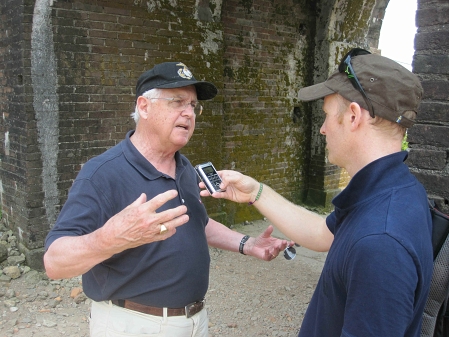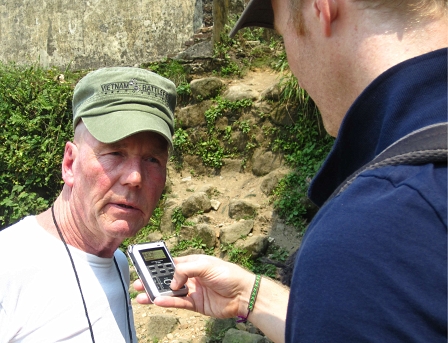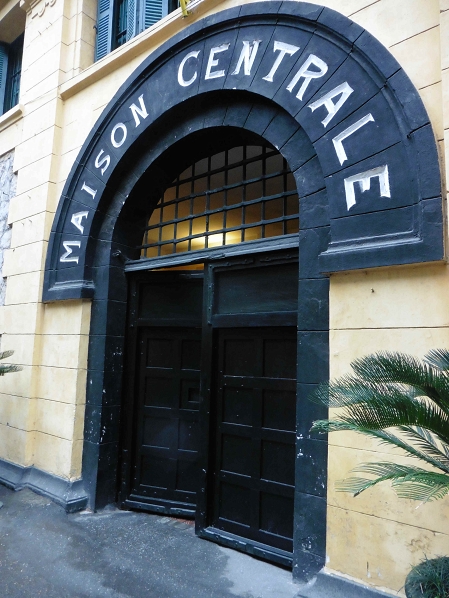Erstellt am: 19. 3. 2015 - 13:30 Uhr
"I saw a lot of blood and a lot of messed up bodies"
The Hai Van Pass crosses a stretch of jungle-clad mountains that form a natural barrier between north and south Vietnam. It's a windblown place, a viewing point, where persuasive women entice you with coffee so strong that it is sure to give you the jitters. The stalls are among some pockmarked bunkers built by the French and then used by the Americans during the series of 20th century wars that devastated this country.
From the pass you look down on the booming port town of Danang, where new 5-star hotels are sprouting like dusty teeth all along a glaring white beach. It was on this stretch of sand where, 50 years ago this month, the first Americans arrived in full combat gear and were greeted by smiling Vietnamese women offering flowers. It was a picturesque beginning to a war that would prove a humiliation for the USA.
"Laying My Demons To Rest"
Walking among the ruins, I meet William Huff, a war veteran from the southern US state of Georgia. He says he has come back to Vietnam 49 years to the day after he disembarked at Danang to "lay my demons to rest." The war ultimately cost the lives of 58.000 American servicemen, including one of Huff's closest friends. "When I was up north where it was really bad I had terrible feelings. I brought a wrapper of a candy bar and buried it for him. He played football for Georgia University so I wrapped it in a football flag from the university. There have been a lot of tears on this trip."

Barbara Köppel
The losses on the other side were much more significant. Victory came at a high price for the communists, who estimates suggest suffered casualties of over a million soldiers – men and women. The Americans perhaps should have paid heed to the warning that communist leader Ho Chi Minh had given the French back in the 1940s: "You can kill 10 of my men for everyone I kill of yours, but even at those odds you will lose and I will win."

Hanoi Women's Museum
The biggest losers, predictably, were the Vietnamese civilians – around four million were killed or injured during the ten years between the US troops arriving in Danang and the last US nationals being whisked off the rooftops of a fallen Saigon.
With all that in mind, how does William Huff feel when he looks back on the war now? "First of all I hate war. How do I feel about it? The same way I feel about Iraq or Afghanistan. I think we have politicians who need to come over and fight and then they'd understand what the hell is going on instead of spilling our blood and treasure on something they know we can't win."
He says that after all these years he still "hates" the politicians who let this happen. "It brings tears to my eyes. It hurts in my heart. We were the Marines. We were the point of the spear. We fought hard. We never lost a battle but our politicians lost the war."
Dieses Element ist nicht mehr verfügbar
"Wrong, Terribly Wrong"
Former US Defense Secretary Robert McNamara, one of the architects of the war, admitted in his memoirs "we were wrong, terribly wrong. We owe it to future generations to explain why."
Carl Hooper, another US war veteran who now lives in Burgenland, Austria, says he has been surprised by the reception he has been given during his time in Vietnam. He has encountered no sign of resentment: "Nobody looks at you wrong. Most of them are too young to remember of course, but still they might see me as the person who killed their father or mother. But they're all friendly."

Barbara Köppel
Hooper says he didn't feel there was a need for the war then and 50 years on he hasn't changed his mind. "My opinion is that we should give the politicians the rifles and the grenades and say: 'Go on: do it yourselves'."
He says it has in many ways been a painful experience returning to Vietnam but that he's sure it is going to "help in the long run." He says he couldn't bear to visit Hamburger Hill, the site of a vicious battle in May 1969. "That was a going away present from Vietnam. I saw a lot of blood and a lot of messed up bodies. I said I'm not going up there again."
"All of a sudden ... kaboom!"
Like Erich Maria Remarque before him, Hooper describes the experience of war as a mix of long stretches of utter boredom followed by brief patches of terrifying drama. "There's nothing and all of a sudden … kaboom!" He says his main worry was looking out for mines and booby traps. "Believe me, there were plenty of them." It sounds very similar to the experience of Iraq veterans of the 21st century.
It is sunny and hot this March day but the weather in northern Vietnam, where Huff fought, can be cold and miserable. Marines have recalled how on patrol they'd ward away the cold by burning the furniture in the huts deserted by terrified locals. Those long days still haunt Huff. "I spent many days taking incoming mortars and rockets. Once I couldn't bathe for 90 days – I changed clothes once in those 90 days."
Huff says he has nothing but respect for the soldiers he fought against 50 years ago. "They were excellent fighters, they were honourable fighters, they were tough fighters." But he can’t help adding "they weren’t as good as we were."
"These Have Been Emotional Times"
He still harbours resentment for the prison guards at Hoa Lo Prison, dubbed the Hanoi Hilton by US troops: "They tortured our aviators. They never accepted it was a war. They never accepted the Geneva Convention. They tortured our pilots who were shot down."

Chris Cummins
But Huff has a heart-warming story of his return trip: "One man travelling with us, a doctor, used to work at an evacuation hospital in the north, near Dong Ha. We pulled into the site and it was all over-grown. Nothing was like it was when we were here. But this boy came up and shouted that we should stay where we were. He got on his motorbike and went to fetch his mother. She was a nurse at the same evacuation hospital that this guy was working at. These were very emotional times for all of us."


